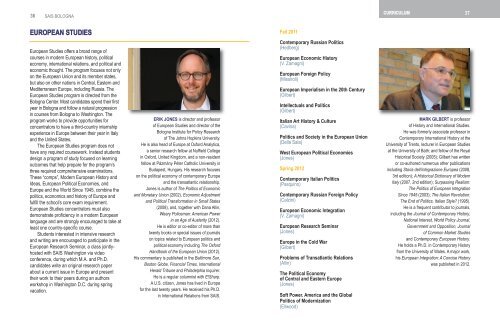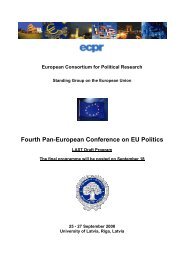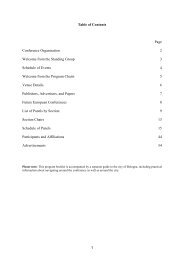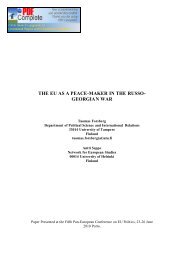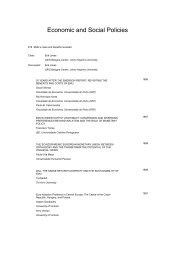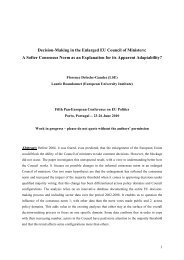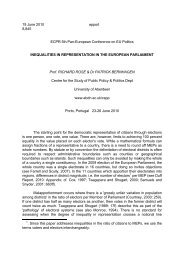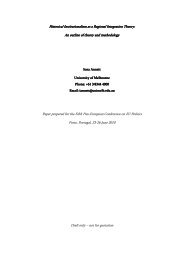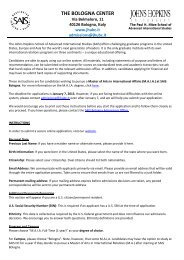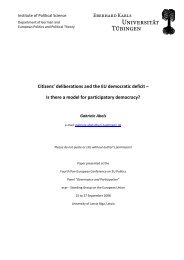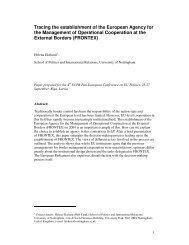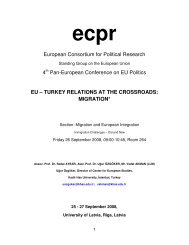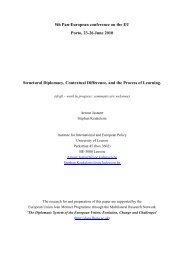Create successful ePaper yourself
Turn your PDF publications into a flip-book with our unique Google optimized e-Paper software.
36<br />
SAIS BOLOGNA<br />
CURRICULUM 37<br />
EUROPEAN STUDIES<br />
Fall 2011<br />
European Studies offers a broad range of<br />
courses in modern European history, political<br />
economy, international relations, and political and<br />
economic thought. The program focuses not only<br />
on the European Union and its member states,<br />
but also on other nations in Central, Eastern and<br />
Mediterranean Europe, including Russia. The<br />
European Studies program is directed from the<br />
<strong>Bologna</strong> <strong>Center</strong>. Most candidates spend their first<br />
year in <strong>Bologna</strong> and follow a natural progression<br />
in courses from <strong>Bologna</strong> to Washington. The<br />
program works to provide opportunities for<br />
concentrators to have a third-country internship<br />
experience in Europe between their year in Italy<br />
and the United States.<br />
The European Studies program does not<br />
have any required coursework. Instead students<br />
design a program of study focused on learning<br />
outcomes that help prepare for the program’s<br />
three required comprehensive examinations.<br />
These “comps”, Modern European History and<br />
Ideas, European Political Economies, and<br />
Europe and the World Since 1945, combine the<br />
politics, economics and history of Europe and<br />
fulfill the school’s core exam requirement.<br />
European Studies concentrators must also<br />
demonstrate proficiency in a modern European<br />
language and are strongly encouraged to take at<br />
least one country-specific course.<br />
Students interested in intensive research<br />
and writing are encouraged to participate in the<br />
European Research Seminar, a class jointlyhosted<br />
with SAIS Washington via video<br />
conference, during which M.A. and Ph.D.<br />
candidates write an original research paper<br />
about a current issue in Europe and present<br />
their work to their peers during an authors<br />
workshop in Washington D.C. during spring<br />
vacation.<br />
ERIK JONES is director and professor<br />
of European Studies and director of the<br />
<strong>Bologna</strong> Institute for Policy Research<br />
of The Johns Hopkins University.<br />
He is also head of Europe at Oxford Analytica,<br />
a senior research fellow at Nuffield College<br />
in Oxford, United Kingdom, and a non-resident<br />
fellow at Pázmány Péter Catholic University in<br />
Budapest, Hungary. His research focuses<br />
on the political economy of contemporary Europe<br />
and the transatlantic relationship.<br />
Jones is author of The Politics of Economic<br />
and Monetary Union (2002), Economic Adjustment<br />
and Political Transformation in Small States<br />
(2008), and, together with Dana Allin,<br />
Weary Policeman: American Power<br />
in an Age of Austerity (2012).<br />
He is editor or co-editor of more than<br />
twenty books or special issues of journals<br />
on topics related to European politics and<br />
political economy including The Oxford<br />
Handbook of the European Union (2012).<br />
His commentary is published in the Baltimore Sun,<br />
Boston Globe, Financial Times, International<br />
Herald Tribune and Philadelphia Inquirer.<br />
He is a regular columnist with E!Sharp.<br />
A U.S. citizen, Jones has lived in Europe<br />
for the last twenty years. He received his Ph.D.<br />
in International Relations from SAIS.<br />
Contemporary Russian Politics<br />
(Hedberg)<br />
European Economic History<br />
(V. Zamagni)<br />
European Foreign Policy<br />
(Missiroli)<br />
European Imperialism in the 20th Century<br />
(Gilbert)<br />
Intellectuals and Politics<br />
(Gilbert)<br />
Italian Art History & Culture<br />
(Cavina)<br />
Politics and Society in the European Union<br />
(Della Sala)<br />
West European Political Economies<br />
(Jones)<br />
Spring 2012<br />
Contemporary Italian Politics<br />
(Pasquino)<br />
Contemporary Russian Foreign Policy<br />
(Calzini)<br />
European Economic Integration<br />
(V. Zamagni)<br />
European Research Seminar<br />
(Jones)<br />
Europe in the Cold War<br />
(Gilbert)<br />
Problems of Transatlantic Relations<br />
(Allin)<br />
The Political Economy<br />
of Central and Eastern Europe<br />
(Jones)<br />
Soft Power. America and the Global<br />
Politics of Modernization<br />
(Ellwood)<br />
MARK GILBERT is professor<br />
of History and International Studies.<br />
He was formerly associate professor in<br />
Contemporary International History at the<br />
University of Trento, lecturer in European Studies<br />
at the University of Bath; and fellow of the Royal<br />
Historical Society (2005); Gilbert has written<br />
or co-authored numerous other publications<br />
including Storia dell’integrazione Europea (2008,<br />
3rd edition); A Historical Dictionary of Modern<br />
Italy (2007, 2nd edition); Surpassing Realism:<br />
The Politics of European Integration<br />
Since 1945 (2003); The Italian Revolution:<br />
The End of Politics, Italian Style? (1995).<br />
He is a frequent contributor to journals,<br />
including the Journal of Contemporary History,<br />
National Interest, World Policy Journal,<br />
Government and Opposition, Journal<br />
of Common Market Studies<br />
and Contemporary European History.<br />
He holds a Ph.D. in Contemporary History<br />
from the University of Wales. A major work,<br />
his European Integration: A Concise History<br />
was published in 2012.


